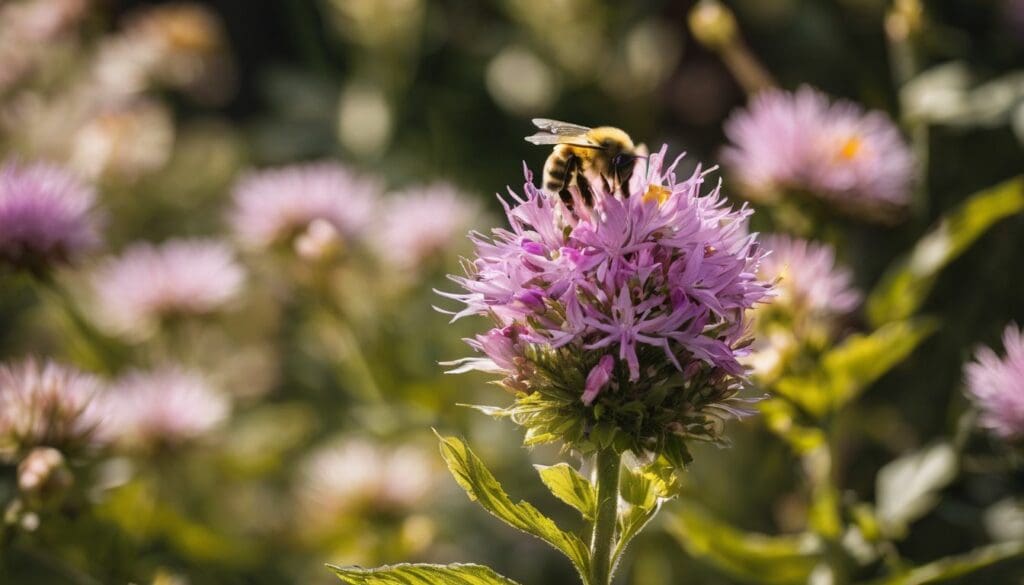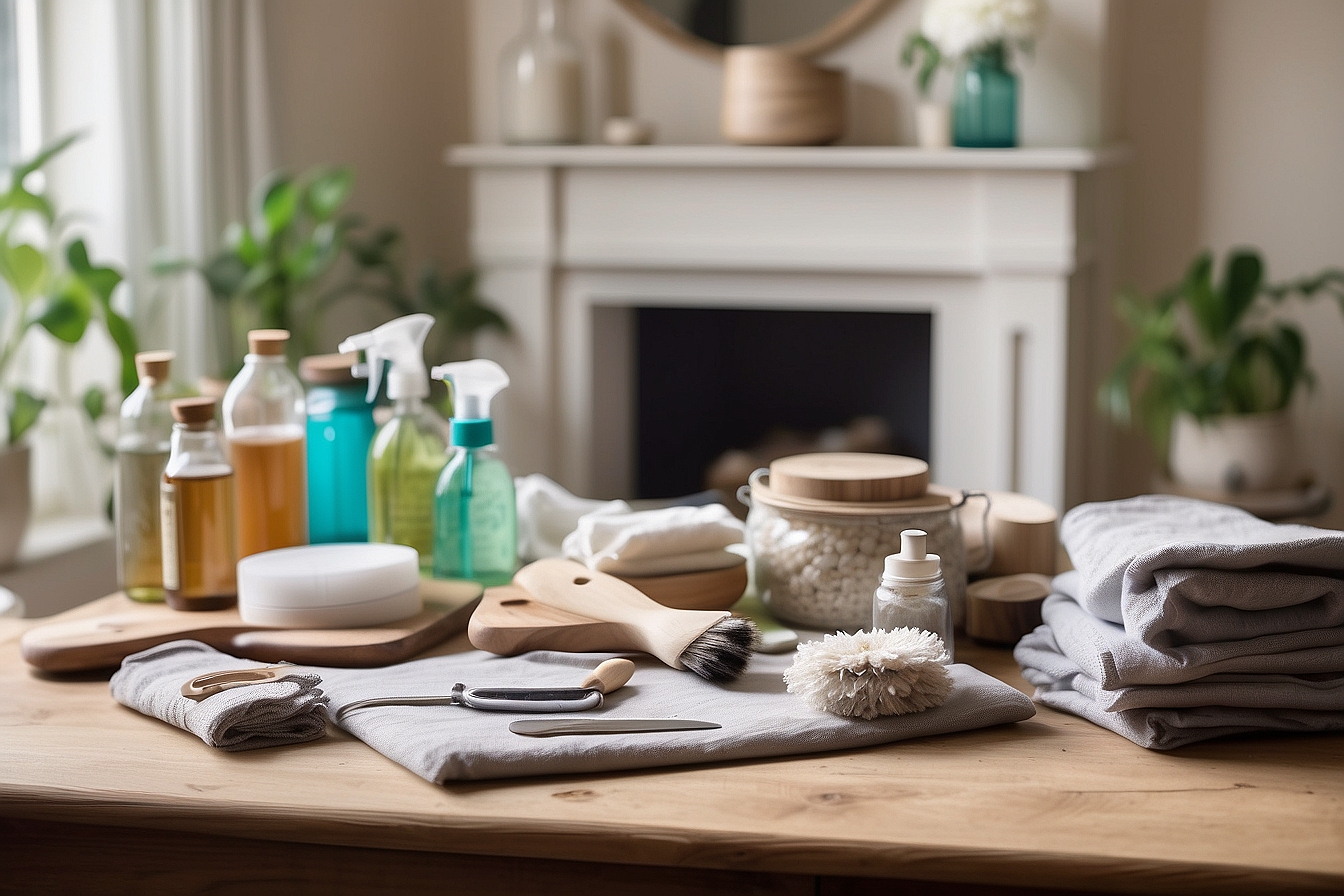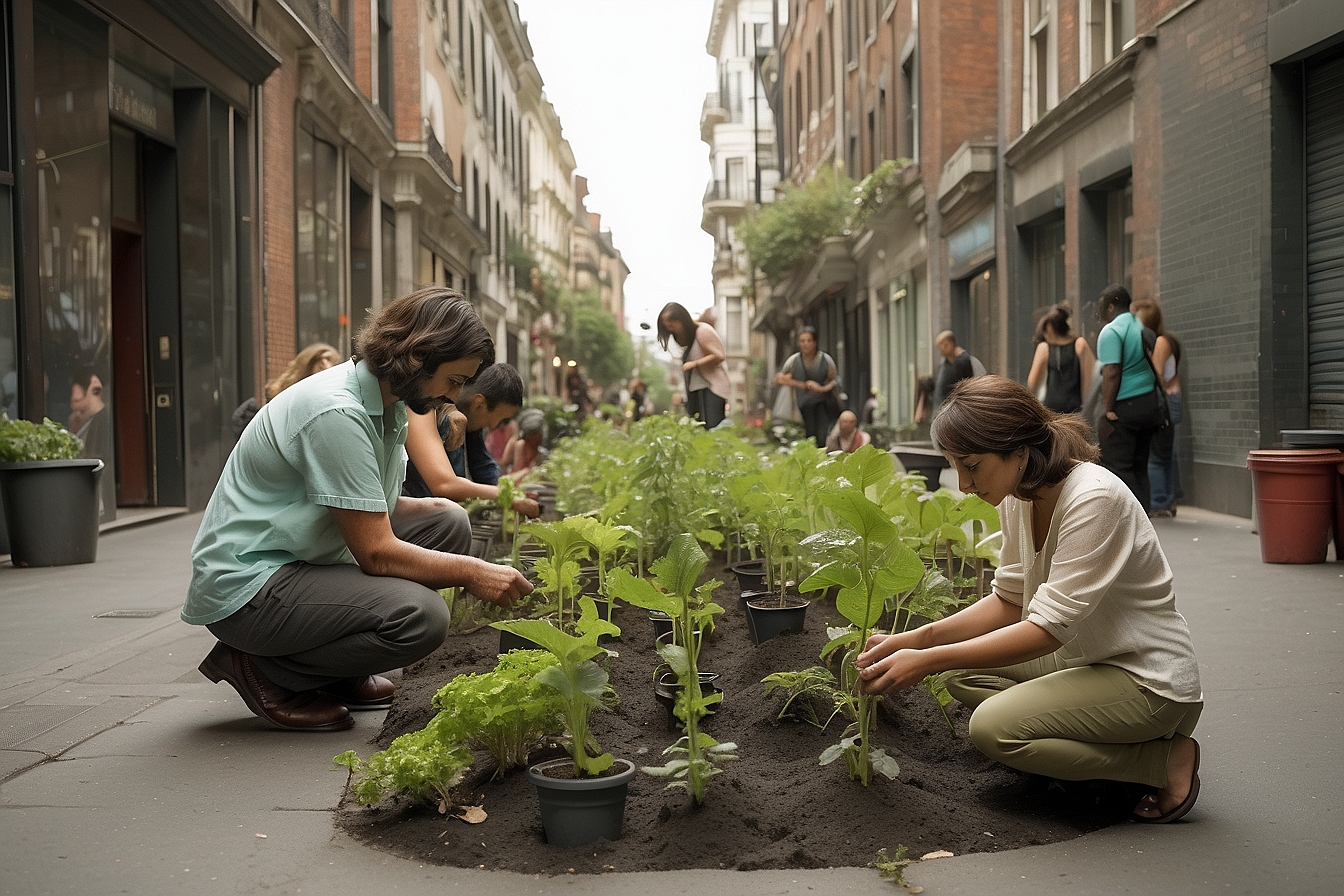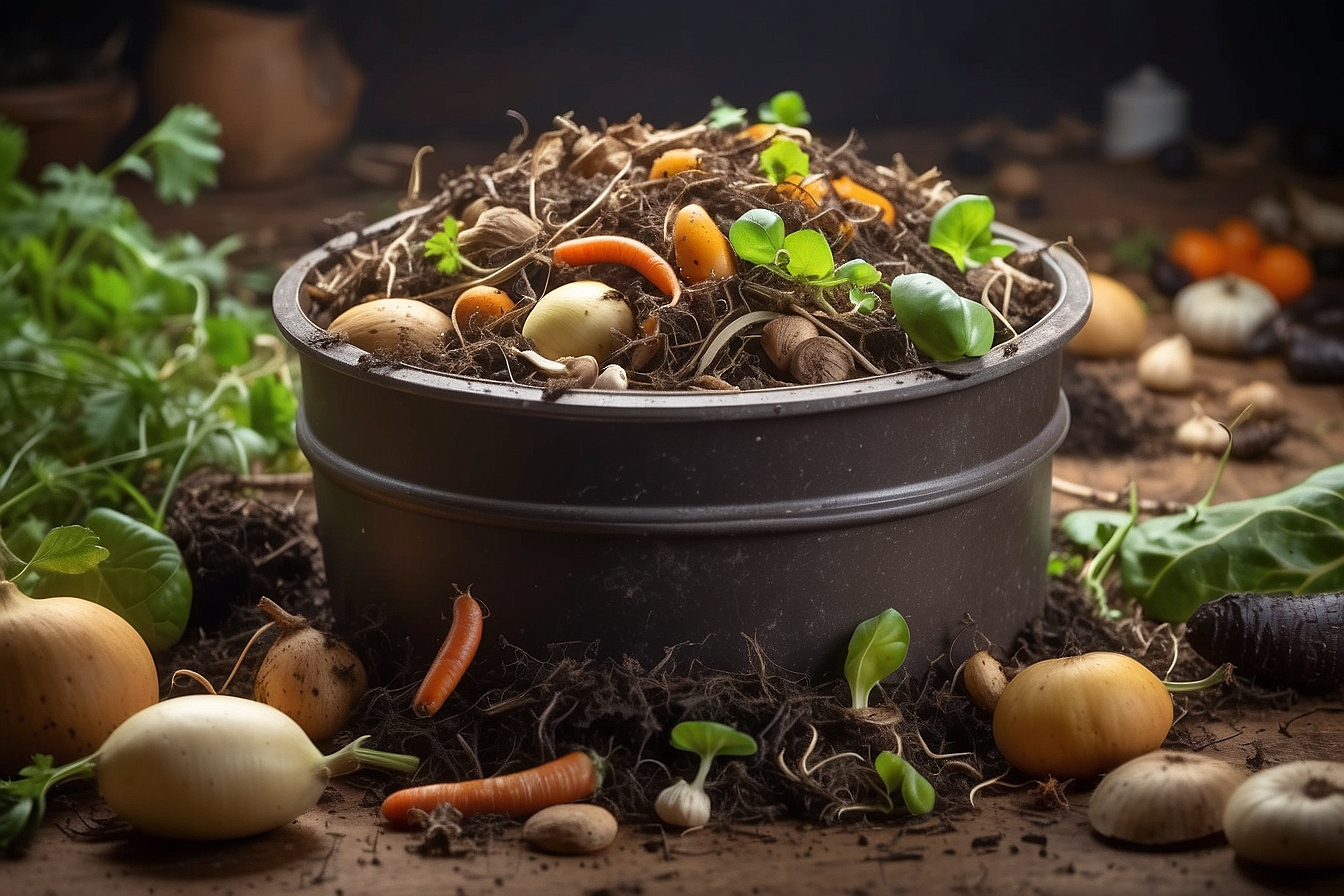Many of us harbour dreams of verdant, thriving gardens but often face the disheartening sight of scattered blooms and uninspiring yields. Fear not, for help is closer than you might think; a single bee colony has the astonishing capacity to pollinate up to 300 million flowers each day.
Our guide delves into this wondrous aspect of bees – your garden’s unsung heroes. As you continue reading, prepare to be charmed by the profound influence these tireless insects have on your botanical haven.
It’s abuzz with insights!
Key Takeaways
- Beekeeping enhances garden pollination, ensuring a surge in the growth of plants and leading to more abundant harvests of fruits like strawberries and vegetables such as tomatoes.
- By promoting an improved ecosystem, beekeeping supports a diverse range of flora and fauna, contributing to soil health while aiding local wildlife populations.
- Keeping bees aids in lessening dependence on commercial pollinators, thereby bolstering sustainable gardening practices and preserving native bee species.
- For the gardener, beekeeping not only improves plant yields but also presents opportunities to harvest honey and beeswax for personal or commercial use.
- Engaging in beekeeping connects individuals with a community of like – minded enthusiasts who share knowledge and contribute together to environmental conservation efforts.
Why Beekeeping is Beneficial to Your Garden
Beekeeping in your garden is incredibly beneficial as it increases pollination, leading to a higher yield of fruits and vegetables. It also helps improve the overall ecosystem, creating a healthier environment for your plants to thrive.
Increased pollination
With beekeeping in our gardens, we ensure a surge in pollination, essential for the growth of many plants. Honeybees hustle from flower to flower, which significantly enhances the chances of flowers turning into fruits.
This is not just a boon for our garden’s aesthetic but also ramps up the production of crops like tomatoes, strawberries and almonds.
Our buzzing friends act as nature’s own matchmakers, aiding the reproduction of flora across our backyard oasis. Imagine every bloom they visit potentially becoming a new source of food or beauty — it’s truly remarkable! Moving beyond increased pollination, let’s delve into how fostering these tiny workers improves the entire ecosystem around us.
Improved ecosystem
Bees play a vital role in maintaining the balance of our garden’s ecosystem. By pollinating flowers, they boost the reproduction of plants, ensuring a rich and diverse array of flora.
This leads to improved soil health and stability while supporting local wildlife populations – all contributing to a more sustainable environment for us and future generations.
Increased pollination resulting from bee activity also means a greater abundance of fruits and vegetables in your garden. The presence of bees enhances the overall biodiversity, creating a thriving habitat for insects, birds, and other small animals within the ecosystem.
Higher yield of fruits and vegetables
With an improved ecosystem and increased pollination, beekeeping in your garden can lead to a higher yield of fruits and vegetables. The presence of bees enhances the overall health of plants by ensuring efficient pollination, which in turn leads to more abundant harvests.
Bee-pollinated crops include popular fruits such as apples, oranges, and berries, along with essential vegetables like cucumbers, squash, and tomatoes. By fostering a bee-friendly environment through beekeeping practices, gardeners can enjoy bountiful produce while supporting the vital role that bees play in sustaining ecosystems.
Benefits of Beekeeping for the Environment
Beekeeping promotes diversity and conservation of plant species, supports local bee populations, and reduces reliance on commercial pollinators. It’s an eco-friendly practice that benefits the environment in multiple ways.
Promotes diversity and conservation of plant species
Beekeeping promotes diversity and plant conservation by supporting the pollination of various plant species. As bees visit flowers to collect nectar and pollen, they inadvertently transfer pollen from one flower to another, aiding in the reproduction of plants.
This process is essential for maintaining the genetic diversity of plant species and ensuring their survival. By participating in beekeeping, individuals contribute directly to preserving a wide range of plants, including native and endangered species.
Furthermore, beekeeping helps sustain healthy ecosystems by enhancing biodiversity. Bees play a crucial role in pollinating wild plants, which are fundamental for providing food and habitat for other wildlife.
Supports local bee populations
By promoting diversity and conservation of plant species, beekeeping plays a vital role in supporting local bee populations. As beekeepers cultivate a variety of plants to provide nectar and pollen for their bees, they contribute to the sustenance and proliferation of local bee colonies.
This active support leads to healthier and more resilient bee populations within the community, which in turn enhances the overall ecosystem and biodiversity.
Furthermore, by reducing reliance on commercial pollinators through localised beekeeping efforts, gardeners can help safeguard native bee species from decline. This approach fosters a self-sustaining environment where indigenous bees thrive naturally without external intervention.
Reduces reliance on commercial pollinators
Beekeeping reduces our dependence on commercial pollinators, ensuring a more sustainable and self-sufficient approach to gardening. By having our own bee colonies, we can rely less on the use of artificial or rented pollination services, contributing to the overall health of our garden ecosystem while also reducing the environmental impact associated with commercial pollination practices.
Supporting local bee populations through beekeeping means less reliance on imported bees for pollination, which in turn helps in maintaining a healthy and diverse population of native bees.
This reduction in dependence not only benefits our garden but also supports wider efforts towards conservation and biodiversity.
Benefits of Beekeeping for the Gardener
Beekeeping can lead to improved success in gardening, the opportunity to harvest honey and beeswax, as well as joining a community of beekeepers. There are many advantages to incorporating beekeeping into your garden – read on to discover them all!
Improved success in gardening
Beekeeping leads to improved success in gardening as it increases the pollination of plants, resulting in better yields of fruits and vegetables. With more active pollinators in your garden, you’ll notice an abundance of flowers turning into healthy produce.
Additionally, beekeeping supports a diverse ecosystem that nurtures the growth of various plant species, further enhancing the overall health and vibrancy of your garden.
Moreover, by engaging in beekeeping, you contribute to the conservation of local bee populations which are crucial for maintaining a balanced environment. The increased presence of bees also reduces reliance on commercial pollinators, ensuring sustainable gardening practices while enjoying higher crop yields.
Opportunity to harvest honey and beeswax
Harvesting honey and beeswax presents a rewarding opportunity for environmentally conscious gardeners. It allows us to enjoy the fruits of our labour, making use of the natural resources available in our own gardens.
Extracting honey provides a sweet reward for nurturing bee populations and contributing to the local ecosystem.
After tending to our hives, we can collect beeswax, which has various uses such as crafting candles or skincare products. The process not only benefits us personally but also supports environmental conservation efforts by encouraging sustainable practices and reducing reliance on commercial products.
Joining a community of beekeepers
After harvesting honey and beeswax, joining a community of beekeepers can offer valuable support and knowledge. By connecting with fellow bee enthusiasts, you can learn from their experiences, seek advice on hive management, and share best practices for sustainable beekeeping.
Being a part of this community allows you to contribute to the conservation of local bee populations while also fostering an appreciation for the vital role that bees play in our ecosystem.
Engaging in a network of fellow beekeepers not only provides access to valuable resources but also creates opportunities for camaraderie and collaboration. Sharing your passion for bees and gardening with like-minded individuals can help inspire others to take up this rewarding hobby, further promoting environmental sustainability within your community.
How to Get Started with Beekeeping
To get started with beekeeping, you’ll need to choose a suitable location for your hive, gather the necessary equipment such as protective gear and tools, and obtain bees from a reputable source.
This step-by-step process will help you create a thriving environment for honeybees in your garden.
Choosing a location for the hive
When selecting a location for the hive, consider placing it in an area with good sun exposure and protection from strong winds. This will help the bees to stay warm and active, encouraging pollination and honey production.
Additionally, choose a spot that is easily accessible for maintenance and monitoring but away from heavy foot traffic to ensure minimal disturbances for the bees.
To maintain healthy bee populations, it’s important to create a suitable environment for them to thrive. A well-thought-out location for the hive can significantly contribute to their success and productivity within your garden.
Getting the necessary equipment
When starting beekeeping, it’s crucial to have the right equipment in place. This includes protective gear such as a bee suit, veil, and gloves to ensure safety during hive inspections.
Additionally, having a smoker on hand can help calm bees and make handling them easier. Other essential items include a hive tool for prying apart frames, a bee brush for gently moving bees without harming them, and feeders for providing supplemental food when necessary.
Furthermore, investing in a good quality beehive is vital. It should be durable and well-ventilated to provide the bees with suitable living conditions. Opting for hives that are easy to access and inspect will make managing the colony more convenient.
Obtaining bees
To begin beekeeping, we need to obtain bees. There are various ways to do this, such as purchasing a nucleus colony of bees from a reputable supplier or acquiring a package of bees.
This typically involves obtaining three pounds of worker bees along with a queen bee in a separate cage. Another option is to catch a swarm of bees, which can be an exciting and cost-effective way to start your hive.
It’s essential to consult with experienced beekeepers and research the best method for obtaining bees that aligns with your location and resources.
Conclusion
In conclusion, beekeeping in your garden brings an array of benefits. It increases pollination, leading to a higher yield of fruits and vegetables. Additionally, it supports the environment by promoting biodiversity and conserving plant species.
For the gardener, beekeeping offers improved gardening success and the rewarding opportunity to harvest honey and beeswax. Getting started with beekeeping is relatively straightforward and can be a fulfilling way to contribute positively to your local ecosystem while enjoying the fruits of your labor.
FAQs
1. What are the benefits of beekeeping in my garden?
Beekeeping in your garden supports pollination, boosts plant growth and helps maintain a healthy ecosystem while providing delicious honey.
2. How does beekeeping help the environment?
Environmental benefits of beekeeping include promoting biodiversity as honey bees pollinate plants, which is vital for sustaining our agriculture and ecosystems.
3. Can keeping bees improve my health?
Yes, the health benefits of beekeeping extend from enjoying natural honey to engaging in stress-relieving outdoor activity that connects you with nature.
4. Are there any disadvantages to beekeeping?
While there are several advantages, such as enhancing crop yields in agriculture through better pollination, potential disadvantages can include the need for regular maintenance and managing stings or allergies.





